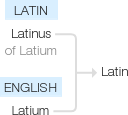Latin
from Latin Latinus ‘of Latium’ (see Latium).
wiktionary
From Middle English Latyn, Latyne, Latin, from Old English Lǣden and Old French latin, latyn, from Latin latīnus, from Latium(“the region around Rome”) + -īnus(adjective suffix). Doublet of Ladino.
From Middle English Latin, Latyn, from Old English Lǣden, from Vulgar Latin *ladinum(“Latin”) and Old French latin(“Latin”); all from Latin Latinus(“belonging to Latium”). Later influenced in form by the Latin word. Compare Dutch Latijn(“Latin”), German Latein(“Latin”), Swedish Latin(“Latin”).
Metonymic occupational surname for a Latinist, a clerk or keeper of Latin records, from Middle English Latyn. Compare Latimer.
etymonline
Latin (adj.)
Old English latin "in Latin," from Latin Latinus "Latin, Roman, in Latin," literally "belonging to Latium," the region of Italy around Rome, a name of uncertain origin. Possibly from PIE root *stela- "to spread, extend," with a sense of "flat country" (as opposed to the mountainous district of the Sabines), or from a prehistoric non-IE language. Old folk etymology connected it with Latin latere "to lie hidden," and a fable of Saturn.
The Latin word also is the source of Spanish and Italian ladino, Dutch latijn, German latein, Irish Gaelic laidionn (n.), Polish lacina, Russian latuinŭ. The more common form in Old English was læden (see Latin (n.)).
In reference to the Roman Catholic Church, 1550s. Used as a designation for "people whose languages descend from Latin" (1856), hence Latin America (1862). The Latin Quarter (French Quartier latin) of Paris, on the south (left) bank of the Seine, was the site of university buildings in the Middle Ages, hence it was the place where Latin was spoken. The surname Latimer means "interpreter," literally "a speaker of Latin."
Latin (n.)
"the language of the (ancient) Romans," Old English latin "Latin, the language of the Romans; any foreign language," from Latin latinium "the Latin language," noun use of the adjective latinius (see Latin (adj.)). The more common form in Old English was læden, from Vulgar Latin *ladinum, which probably was deformed by influence of Old English leoden "language." For "the Latin language" Old English also had lædenspræc.
In Old French the word was used very broadly, "speech, language:" "What Latin was to the learned, that their tongue was to laymen; hence latino was used for any dialect, even Arabic and the language of birds ...." [Donkin, "Etymological Dictionary of the Romance Languages," 1864].
Roughly speaking, Old Latin is the Latin before the classical period including early authors and inscriptions. Classical Latin flourished from about 75 B.C.E. to about 200 C.E., the Latin of Lucretius, Catullus, Caesar, Cicero, Virgil, Horace, Ovid, Livy, Seneca, etc.; it is the standard Latin of the grammars and dictionaries. Late Latin followed the classical period to about 600 and includes the early church fathers. Medieval Latin was the Latin of the Middle Ages, from about 600 to 1500. Modern Latin is Latin as written from about 1500 on, largely by scientific writers in description and classification. Vulgar Latin was the speech of the Roman home and marketplace, going on concurrently under Classical and Late Latin.
